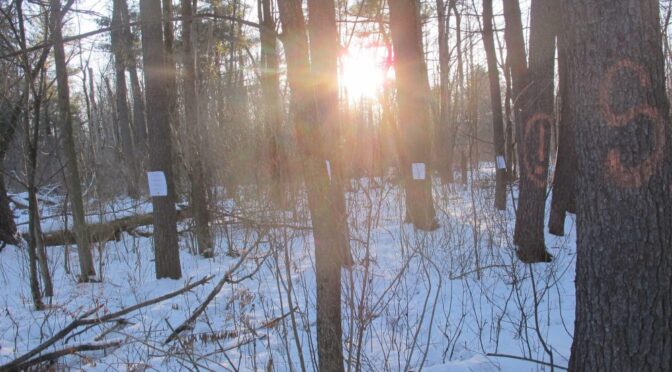One of Montéregie’s last natural environments is in jeopardy! The planned construction of the Northvolt battery plant in Saint-Basile-le-Grand is an ecocidal disgrace. If this project goes ahead, 1.4 square kilometers of wetlands and woodlands will be razed to the ground, serving the greenwashing strategy of our governments, and doing so with public funds.
The area is home to a diverse fauna (bats, birds, amphibians, turtles, snakes, etc.), including several species classified as “threatened” or “endangered”. There are even 142 species of birds that frequent the site! At the same time as public transport companies are undergoing a wave of budget cuts, the provincial and federal governments prefer to give $7.3 billion to the private sector to perpetuate the “car culture”. Instead of investing in more environmentally-friendly collective solutions (trains, buses, car-sharing) in the city and the regions, the governments are perpetuating our dependence on the car, hand in hand with polluting industries and the wealthy.
The Saint-Basile-le-Grand plant project is an integral part of “Projet Saint-Laurent”, an economic development strategy championed by François Legault that aims to transform the St. Lawrence Lowlands into a kind of Quebec Silicon Valley, focusing on “innovation zones”. Northvolt is therefore part of a capitalist approach to ecological transition, just like other projects such as the Littoral Est project in Quebec City, the REM or the Ray-Mont Logistiques transshipment platform that citizens in Montreal’s east end are fighting against. Under capitalism, the energy transition, i.e. the move away from hydrocarbons, means the multiplication of open-pit mines, particularly in the global South, to extract the metals used to manufacture batteries, the construction of new hydroelectric dams on First Nations lands, the establishment of mega-factories on the banks of our waterways, not to mention the ambition of many countries to increase nuclear power. Against these false solutions that threaten the ecosystems we mobilize, Northvolt is a project of capitalist capitalism.
We have taken the initiative to oppose this deforestation by inserting steel bars and nails into the trunks of trees endangered by the plant. While having minimal impact on the health of the trees, these pose a significant risk to heavy machinery.
The harvesters currently employed in the field will be severely damaged if their heads come into contact with the metal objects when cutting*.To stop Northvolt, we need to multiply our tactics and hit where it hurts: causing economic risk and uncertainty. Contrary to Minister Fitzgibbon’s claims, we didn’t come across any “three-eyed fish”, but rather were accompanied by birdsong and were able to walk the countless paths made by the animals that inhabit the woodland. We gave the forest weapons to defend itself!
Spiking is a proven method of direct action. It was used in the early 1980s by Earth First! to prevent the felling of redwoods in the US Pacific Northwest, and was popularized by the book “Ecodefense: A Field Guide to Monkeywrenching” written by Dave Foreman, one of the founders of the environmental group (the book is available online here).The method was also used against the clear-cutting of primary forests in Clayoquot, British Columbia. This mobilization culminated in the summer of 1993 in the largest act of civil disobedience in Canadian history, before the Fairy Creek blockades in 2021, where the method was once again used by activists. In May of this year, activists from Soulèvements de la Terre did the same to protect oak trees in the Bord forest east of Rouen in France.
Today, we are calling for a broad mobilization against the destructive Northvolt mega-plant project. We must attack this destructive machine for crushing life by targeting its weak points. Let’s sabotage the equipment, block the construction sites and harass the industry’s elected representatives. The environmental movement must redouble its efforts.
*Similarly, when cutting, if a chainsaw hits a nail, it will damage or break the chain. The chain will have to be resharpened – a waste of time – or even replaced, and the felling operation resumed at a slightly higher level to avoid hitting the nail again, in the hope of not encountering a second one. Deforestation will be all the more painful, costly and potentially dangerous.
P. S. We are in no way hostile to workers: we are against those who profit from the destruction of the living and who put profit above all else. In this sense, the working class is exploited by our economic system in the same way as the earth, animals and plants that make the land thrive. To ensure that the people hired to clear the forest are well aware of the risks involved, we’ve marked the studded trees with an aerosol-painted S sign, and added posters explaining our tactics. We hope the workers will enforce their rights and stay away from the marked trees.

